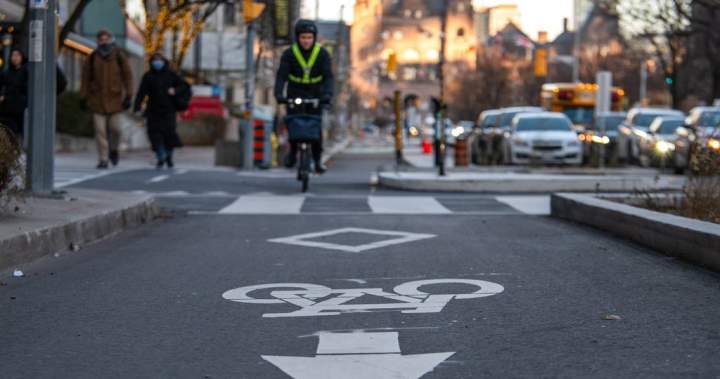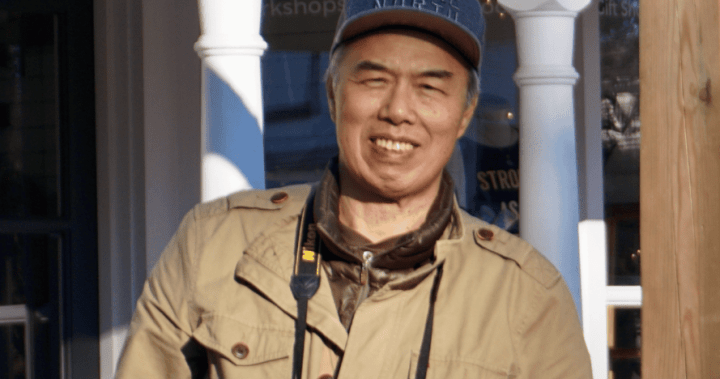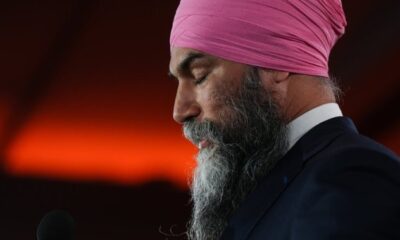Ford government formally appeals ruling deeming Toronto bike lane removal unconstitutional

Premier Doug Ford’s government has formally filed a notice of appeal challenging a court ruling deeming its plan to tear out dedicated bike lanes in Toronto unconstitutional.
Environmental law charity EcoJustice and advocacy organization Cycle Toronto said Friday that the Ford government had filed a notice of appeal on Thursday; the government said in July that it would appeal the decision.
In his July 30 ruling, Superior Court Justice Paul Schabas said the province’s move to take out bike lanes would be “inconsistent” with the constitutional protection of life, liberty and security. The ruling said an updated version of the law, passed in June and requiring bike lane reconfiguration instead of removal, would also breach the Charter.
In its appeal, the government said the judge made “multiple errors of law and mixed fact and law,” including erring “in finding that removing a ‘harm-reduction’ measure provided by government could constitute a deprivation in the absence of a constitutional obligation to provide the harm-reduction measure in the first place.”
The organizations said in a statement that the judge’s ruling is sound.
“The strength of the evidence and the reasoning of the decision give the applicants confidence as they head to the Ontario Court of Appeal to defend their win for people in Toronto and across the province,” they said.

The ruling came after months of legal wrangling and a court-imposed injunction that has, so far, prevented the province from following through on its promise to remove bike lanes from Toronto’s Bloor Street West, Yonge Street and University Avenue.

Get daily National news
Get the day’s top news, political, economic, and current affairs headlines, delivered to your inbox once a day.
The original legislation — Bill 212 — was fast-tracked through the Ontario legislature in late 2024.
It gave the province the power to assess cities’ plans to install bike lanes moving forward and review infrastructure that had been added in the past half-decade.
It allowed Ontario to reverse the installation of bike lanes, specifically three major streets in Toronto.
Cycle Toronto immediately launched a Charter challenge, claiming the law was “ill-conceived and arbitrary” and would result in an increased number of injuries and deaths.
The Ford government’s 2025 budget included the removal of additional lanes on Avenue Road, effectively replacing the law passed at the end of 2024. The revised law changed Ontario’s language from requiring the “removal” of specific bike lanes to “reconfiguring” them so an extra lane of traffic could be added back in.

Ford blasted Schabas earlier this month, accusing him of “trampling on” democratic rights, while simultaneously repeating his confidence in the legal system.
“This is the most ridiculous decision I’ve ever seen. You talk about the Charter; it’s trampling on the democratic rights of Ontarians that elected a government just a few months ago,” Ford said on Aug. 6.
“I have confidence in the courts, I have confidence in the court of appeals, let’s see what happens from there.… But I’ve never seen a decision like this that a judge overrules the people of Ontario because of ideology — not because of law — ideology.”
— with files from Isaac Callan and Colin D’Mello
© 2025 Global News, a division of Corus Entertainment Inc.


The Supreme Court of Canada has declined to hear an appeal of a lower-court ruling that upheld a First Nation’s ownership of a stretch of land at a popular Ontario beach after a lengthy dispute.
Canada’s top court has dismissed the appeal request from landowners and the province after a stretch of land along Sauble Beach was returned to Saugeen First Nation in 2023.

Get breaking National news
For news impacting Canada and around the world, sign up for breaking news alerts delivered directly to you when they happen.
This dismissal comes nearly two months after members of Saugeen First Nation changed the iconic “Welcome to Sauble Beach” sign that greeted beach visitors.
The temporary “Welcome to Saugeen Beach” sign was erected to reflect the First Nation’s ownership of the land, with the town’s mayor expressing disappointment that he wasn’t alerted of the change.
The Ontario Court of Appeal upheld last December the decision that 2.2 kilometres of the coastline in South Bruce Peninsula was incorrectly surveyed 170 years ago.
The portion of the land is valuable fishing ground for the First Nation community and was surrendered in 1854 in an agreement with the Crown to give up portions of Bruce Peninsula.
© 2025 The Canadian Press

The majority of post-secondary students in Ontario are stressed about their finances heading into the school year, a new survey found.
The survey from TD Bank, which collected data from post-secondary students across the country, found that 92 per cent of all respondents in Ontario are stressed about their finances.
“The survey was clear that our students are experiencing a lot of stress, which is a bit unique from previous generations because of the multitude of factors that are just hypersensitive at this point, with higher unemployment, higher cost of living, higher tuition,” says Joe Moghaizel, vice-president of everyday advice journey at TD.
The survey found that while 78 per cent of Ontario parents believe their child has experienced financial stress in the past three months, that figure was well below the actual number of 92 per cent.
“What’s interesting is the amount of pressure and stress that they’re currently facing and feeling, and the disconnect between what their parents believe they’re experiencing,” Moghaizel says. “Parents were not aware of the amount of stress that the students are feeling.”
Moghaizel pointed to a number of things leading to this financial pressure, including the high cost of living and high rate of unemployment among young people in a difficult job market, leading to many students to have what he called a volatile income.

Get breaking National news
For news impacting Canada and around the world, sign up for breaking news alerts delivered directly to you when they happen.
The survey also found that Ontario had the highest percentage of students stressed about tuition costs at 35 per cent, compared with an average of 26 per cent in other provinces.
The government of Canada estimates it will take almost 10 years for the average student to pay off their student loans and the total student loan debt in Canada surpassed $23.5 billion in 2022.
“You go back to over two decades ago, when I was in school, the financial pressures that students deal with now are significantly higher because tuition is a lot more expensive and the cost of living is more expensive, and inflation has really taken a bite at students,” Moghaizel says.
Another key takeaway from the survey was that 36 per cent of all respondents found that social spending stressed them out the most.
Moghaizel says the social pressure speaks to the online environment that students find themselves in today, where everything they do is shared online.
“They all feel the pressure to spend and keep up, which, again, it’s not too dissimilar from other age groups and we’re keeping up with the Joneses and just keeping up with the spending habit of your circle creates a bit of pressure,” he says.
Moghaizel says this can leave post-secondary students feeling ill-equipped to manage their finances better.
Despite the concern, Moghaizel hopes this information is not discouraging to students and is an opportunity to start establishing good financial habits early in life.
He said that with societal pressures, it’s good for students to understand their needs versus their wants, and focus on prioritizing the necessities. Moghaizel says that through tracking their spending, students can see where all of their money is going.
“We want to make sure that we’re equipping students with the right understanding of financial knowledge for the products and services,” Moghaizel says.
© 2025 Global News, a division of Corus Entertainment Inc.

A Canadian man has pleaded guilty to illegally photographing classified U.S. defence facilities at the Space Force military base in Cape Canaveral, Fla.
Xiao Guang Pan, 71, of Brampton, Ont., pleaded guilty to three counts of unlawful photographing of military installations without authorization on three separate days in early January.
A U.S. District Court in Florida judge put Pan on probation for 12 months and immediately ordered him deported to Canada by U.S. Immigration and Citizenship Enforcement (ICE) officers under the U.S. Immigration and Nationality Act, citing his violations of American espionage laws.
Pan did not immediately respond to a request for comment.
A U.S. Department of Justice official was unsure about where Pan is in the ICE deportation process.
Pan’s guilty plea and deportation come as anxiety grows among U.S. lawmakers and ordinary Americans about hundreds of unidentified drones flying over sensitive American military bases amid concerns about foreign surveillance and spying.
A copy of Pan’s plea agreement reveals a stark contrast between what Pan said he was doing in Florida in January, when he was stopped by police, versus what U.S. federal agents actually found on his drone, phone and storage devices after seizing them.
On an artist biography page published by the Brampton Arts Organization, Pan stated he was born in China in 1953, immigrated to Canada in 2001 and has lived in Brampton since 2003.
Pan worked as a Best Buy Canada technician for 18 years until retirement in 2022, the biography adds.
Pan entered U.S. via Detroit
Pan entered the U.S. on a tourist visa at the Ambassador’s Bridge in Detroit, Mich., on or about Nov. 2, 2024. The court documents don’t suggest what Pan was doing or where Pan travelled in November and December.
The retiree was charged by summons on Feb. 11 after the National Aeronautics and Space Administration (NASA) detected drone activity near the Space Force Base and called in law enforcement on Jan. 7.
Brevard County Sheriffs responded. They saw Pan operating a DJI Mavic Pro 3 unmanned drone quadcopter from a parking lot in Port Canaveral and learned he’d been in the area for three days.
The local officers then tipped federal law enforcement agencies.
Federal agents caught the Brampton resident using his powerful unmanned drone and a separate camera with telephoto lenses to photograph and video classified military facilities and equipment near the Space Force base on Jan. 5, 6 and 7, without the base commander’s prior authorization as required under U.S. law.

Get breaking National news
For news impacting Canada and around the world, sign up for breaking news alerts delivered directly to you when they happen.
According to a statement of facts found in the plea agreement, which Pan signed and initialled on every page, U.S. federal agents interviewed him twice – no dates were given – and asked the Canadian what he was doing with the drone.
They also warned him: lying to federal agents is a federal crime in the U.S.
“Pan told the agents that he had flown his drone to take pictures of the beauty of nature, the sunrise, and the cruise ship port. He stated that he had not seen any launch pads and that he did not know that he was near a military installation,” the plea deal states.
Pan voluntarily submitted his devices to U.S. agents for a forensic data extraction.
That’s when the investigators found more than sunrises, nature and cruise ship videos.
The data showed Pan had flown his drone nine times and taken 1,919 photographs and videos during his three-day Florida visit, the plea deal states.
Of those 1,919 photos and videos, 243 photographs and 13 videos showed specific images of Space Force base military infrastructure and launch facilities, including fuel and munitions storage facilities, security checkpoints, and a Navy submarine platform, according to the plea agreement.
On Jan. 6, his second day of flying the drone quadcopter, Pan took nine videos and 166 photographs of Space Force installations.
This time, he launched his drone from a location several miles closer to the base; his photographs and videos captured the same military infrastructure as on Jan. 5, but in higher quality and from different angles, according to the plea agreement.
Pan also captured images and videos of mission control infrastructure and fuel and munitions facilities, including a photograph of a Space Launch Complex and payload processing facilities operated by two defence contractors.
On the third day of his drone flying, and before he was encountered by law enforcement, Pan recorded two more videos and took 56 photos.
Day 3 images included security checkpoints
His Day 3 images and videos showed roads, power distribution infrastructure, security checkpoints, mission control infrastructure, national security space launch infrastructure, fuel and munitions storage, and naval infrastructure, the plea agreement states.
After police stopped Pan on Jan. 7, federal agents interviewed him twice.
During those interviews, Pan was warned that lying to agents is a federal crime. He did so anyway, the plea deal suggests.
In addition to telling agents he flew his drone to record nature, sunrises, and cruise ships and didn’t know he was near a military base, Pan said his drone sends alerts and warnings to his handset and he received no alerts or warnings, the plea deal adds.
Investigators recovered flight log data from Pan’s quadcopter. It showed that on all three days he flew, the drone logged several alerts and sent operator messages about altitude and FAA airspace violations.
On Pan’s cell phone, agents also found several screenshots he created, including several Google Maps satellite overviews of Cape Canaveral. One screenshot taken Jan. 7 while Pan was at his drone launch location, prominently displayed the words “Cape Canaveral Space Force Station.”
Pan surrendered his $5,000 quadcopter
Pan was charged in February after a multi-agency probe led by the U.S. Federal Bureau of Investigation, U.S. Homeland Security, and the U.S. Air Force Office of Special Investigations.
Pan surrendered his $5,000 quadcopter, control equipment and storage devices that housed his videos and photos to the U.S. authorities.
He is also banned from returning to the U.S. without prior consent from the Secretary of the Homeland Security department.

-

 Uncategorized3 months ago
Uncategorized3 months agoShop Proud, Eat Proud, Be Proud — Ottawa Canada Day Market This June 28th
-

 3 months ago
3 months agoCanada’s world junior trial saw juries tossed, intense testimony. Here’s a recap
-

 2 months ago
2 months agoRing of Fire road to bring prosperity to First Nation, problems for caribou: report
-

 2 months ago
2 months agoMeasles circulating in northeastern B.C. community, health officials warn
-

 3 months ago
3 months agoAnishinabek Nation chief says he briefed Ontario police on protests against Bill 5
-

 2 months ago
2 months agoFormer major leaguer, Jays doctor Ron Taylor dies
-

 2 months ago
2 months agoJagmeet Singh apologizes for attending Kendrick Lamar concert after Drake calls him out
-

 2 months ago
2 months agoDreaming of a lakeside cottage but can’t afford it? Co-ownership could open that door







